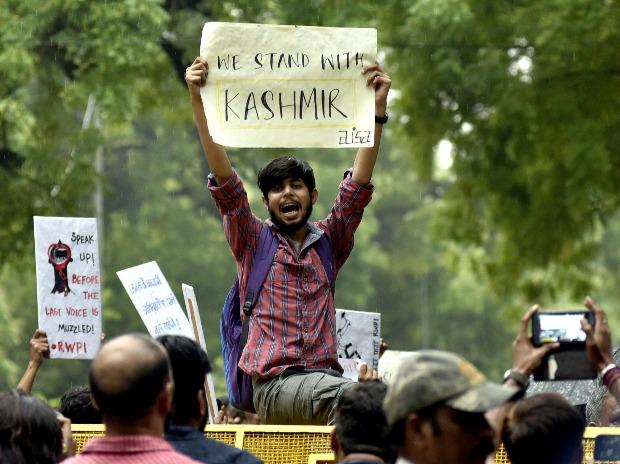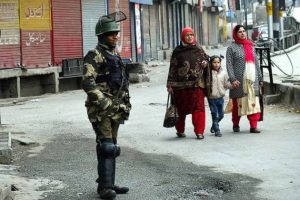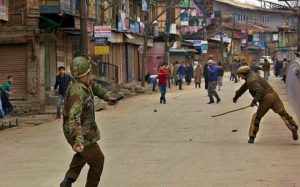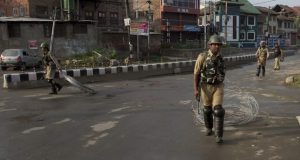200 days since abrogation of Article 370 : Alienation, clampdowns, denials and detentions continue to plague Kashmiris

Auqib Javeed, Twocircles.net
Srinagar: On August 5, the Indian government withdrew Article 370 of India's constitution, which gave the erstwhile state of Jammu and Kashmir semi-autonomy, and split it into two federal territories in an attempt to integrate it fully into India.
The decision of the Narendra Modi led BJP government; to change Kashmir’s status and tighten the government’s grip over the region in August stoked anger and resentment among the people. The right-wing party at the Centre had expected a massive revolt in response from the public and only to keep everything under control, it launched a mass crackdown and detained thousands of people across the region. The authorities didn’t even spare the mainstream political leaders and former chief ministers Dr Farooq Abdullah, Omar Abdullah and Mehbooba Mufti, who acted as a bridge between the Centre and the state and kept them under house arrest. For six months, life in the Valley has been on a standstill amid curfews, communication blockade, internet shutdown, night raids and detentions.
On 20th February, Kashmir completed 200 days of lockdown and restrictions since the government bifurcated the region into two Union territories. Against the Indian media’s endorsement of normalcy, life in Kashmir is yet to be on track with thousands of people including the mainstream politicians still under detention. Most recently, the death rumours of top Separatist leader Syed Ali Shah Geelani has kept Kashmiris on their toes from last week. Analysts believe death of a senior leader of his stature can trigger fresh waves of unrest and as an act of prevention the authorities have snapped the already ailing 2G internet services.

Simultaneously, the Union Government in last two weeks has booked over a dozen pro-Indian politicians under the controversial Public Safety Act (PSA) - a law that allows detention of any person up to two years without any trial. Senior Abdullah is the only mainstream politician against whom Public Safety Act (PSA) was slapped in September for a period of three months, which was renewed on December 16 last year. The government also booked a top ex- bureaucrat, Shah Faesal under the PSA.
Despite the government’s best efforts in trying to project that everything is normal in Kashmir, here is a ground report on 200 days after the abrogation of its special status:
Economy
Kashmir has suffered over $2.4 billion losses since Article 370 was amended (https://smartinvestor.business-standard.com/market/story-616536-storydet-Kashmir_sees_over_24_billion_losses_since_Article_370_was_amended.htm). The economy of the region is on a death bed and even as the Valley heads towards Spring which witnesses record number of national and international tourists, there is no indication that tourism would revive in the upcoming months. Tourism is one of the worst hit sectors affected by the lockdown and information blackout that followed. According to IndiaSpend, Kashmir tourism has dropped 86% since Article 370 was de-operationalized. While in 2018, Kashmir had received 316,434 tourists between August and December, in 2019, this number has fallen to 43,059 for the same period. This has accelerated loss of jobs in tourism and handicrafts sector and as estimates from the Kashmir Chamber of Commerce and Industry reveal, a total of 144,500 people have lost their jobs that depended on earnings from tourists. The same report concludes that overall, commercial losses in the state caused in the aftermath of scrapping Article 379 is over Rs 15,000 crore with total job losses at 496,000.

Tourism is one of the pillars of Kashmir’s economy. Thousands of people are associated with the trade. Looking back, 2019 wasn’t good for tourism and the state’s economy. Although the UT Government has lifted the advisory for tourists, they must know that mere lifting advisory wouldn’t serve any purpose.
Communication blockade
Since August 5, Kashmir was placed under a strict communication blockade, making it the longest ever Internet shutdown in a democracy (https://www.washingtonpost.com/world/asia_pacific/indias-internet-shutdown-in-kashmir-is-now-the-longest-ever-in-a-democracy/2019/12/15/bb0693ea-1dfc-11ea-977a-15a6710ed6da_story.html). After around six months the government has finally restored internet in Kashmir, albeit with severe curbs on its usage still in place including the ban on social media. The protracted ban on internet as well as on phone calls and text messaging inflicted untold suffering on the people. The people were not only disconnected from the world but it also deprived thousands of their livelihoods. Most small scale businesses dependent on the services simply collapsed virtually putting their owners and the employees on the road.
Education and schooling is another department that suffered heavily due to the communication clampdown. Both school and university students have come to exceedingly rely on the internet as a critical tool of education but everything stopped as there was no internet for a period exceeding five months. More so, in the absence of schooling when internet was direly needed as compensatory facility, it was snatched in the name of security measures.
Looking back, it was an unprecedented step. Now the government has continued with the restrictions on social media and also blacklisted a number of sites. Only white listed sites can be accessed. Despite restoring 2G internet in the Valley, Instagram, Facebook, and WhatsApp are not listed in the 301 white-listed sites that Kashmiris can access.

Most recently, panic gripped the whole region when the Jammu and Kashmir Police booked over 200 people for misusing the VPNs (https://www.thehindubusinessline.com/news/national/jk-police-lodges-fir-against-kashmir-people-accessing-internet-via-vpn/article30850846.ece#). To bypass the social media ban, Kashmiris used VPN’s (Virtual Private Network) and proxy servers but the government has started lodging FIRs in the names of VPN users. The Jammu and Kashmir police maintain that the ban on social media is must as Pakistan is trying to disturb peace in Jammu and Kashmir through social media and that full access to Internet at this hour would create law and order problems in the region.
However, the Kashmiris assert that they use social media to highlight “Indian brutalities” in Kashmir and that is why the authorities are against restoring social networking sites.
Detentions and raids
Ahead of the August 5 decision, thousands of Kashmiris were rounded-up by Jammu and Kashmir police. So far, nearly 5,000 people have been arrested; including leading Kashmiri politicians and separatist activists. According to government officials, more than 350 people have been arrested under the PSA and shifted to jails outside Kashmir.
According to the Jammu and Kashmir Coalition of Civil Society (JKCCS), a local human rights group, 662 Kashmiris were charged under the PSA last year, out of which 412 cases were registered after August 5. Although the government had revoked PSA of 26 detainees but no indication followed regarding the release of other detainees.
At present, hundreds of Kashmiri prisoners who were detained and shifted to outside jails, far away from their homes are still behind bars while the families are struggling to meet them. Many families are unable to meet the detainees because of the poor financial conditions. In the absence of proper legal counsel, the detainees continue to face abuse and torture behind bars.
With over 200 days of communication clampdown and internet restrictions, Kashmiris feel alienated from the rest of the world. The absence of free communication networks and the continued detention of top mainstream politicians has further revealed that the Kashmiri public and political opinion has been brutally suppressed, if not mercilessly murdered in the largest democracy.
